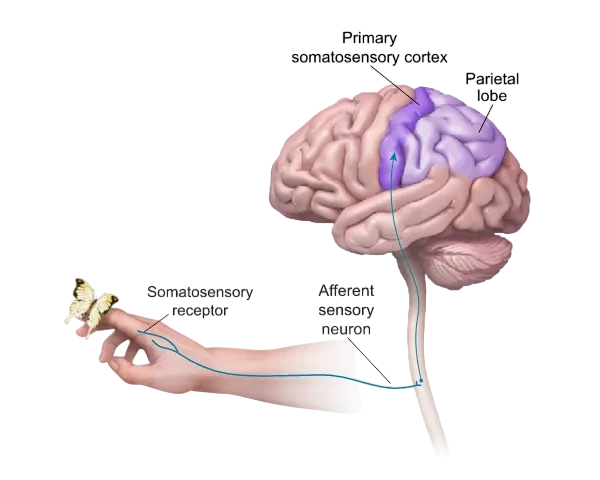The second section of the AP Psychology exam consists of two free-response questions and accounts for 33.3% of your final score. These FRQs always follow a specific format.
How to Answer AP Psychology Free-Response Questions
The FRQ section of the AP Psychology exam challenges you to come up with your own answer rather than providing multiple-choice options. You will need a solid grasp of the tested content, a logical approach to tackling the questions, and effective time management to do well on this portion. Regular practice with targeted question sets, like those in our AP Psychology practice tests, can help reinforce key concepts and improve your ability to apply them under exam conditions. Here are some tips and strategies to help you succeed:
Understand How the FRQs Are Scored
AP Psychology teachers and college instructors score the FRQ responses. They award points when a requirement outlined in their standards is met. You must demonstrate your understanding of each part of the question to earn maximum points.
- Even though the AP reader who scores your FRQ is an expert, it’s important to write your responses simply, as if you were explaining the concepts to someone unfamiliar with psychological theories and concepts. Practicing with a structured AP Psychology online course can help you refine your ability to present clear and well-organized responses.
- Each AP Psych FRQ is different and will include prompts for you to address. For example, you may be asked to compare or contrast individuals, take a stance on an issue, explain how a list of terms applies to a scenario, or draw a graph. Make sure to identify and address each part of the question.
- Before you start writing, carefully read and think about the question. Organize your thoughts and begin with a clear thesis statement. Make sure to support your broader statement with clear evidence.
- Incorporate information from your AP Psychology course to support your argument and clearly explain how it relates to the question and informs your answer.
- Organize your answer so that it mirrors the organization of the question. If the question has parts (a), (b), (c), (d), and (e), your answer should have the same labels and be in the same order. Doing this will make it easier for your reader to grade.
- When explaining a concept, express your thoughts in complete sentences. Remember to demonstrate your understanding rather than just provide simple definitions. If asked to apply the concept of negative reinforcement, describe how an undesirable stimulus is removed as a consequence of a behavior and explain how this increases the likelihood of that behavior being repeated. Simply stating that negative reinforcement involves the removal of an undesirable stimulus may not be enough to earn a point.
- Even if you're unsure, try to answer as many parts of the question as possible within the time limit. There are often multiple ways to earn points for a particular part of a question. The only way to score zero points is by skipping a question.

Pay Close Attention to the Wording of the FRQ
Carefully follow the instructions so you can successfully answer all parts of a question and earn full points. You will find a list of common task verbs below with examples to help you know what to do when they appear in a question.
- As you read a question, circle or underline each instruction. Think about what you need to do to answer that part of the question.
- Mark off each part of the question as you finish writing it in your answer. This will help keep you on track. Before you go on to the next question, double-check that all parts of the question have been addressed.
Use Your Time Wisely
You will have 70 minutes (25 minutes for Question I and 45 minutes for Question II) to complete the two FRQs on the AP Psychology exam.
After reading over the questions, answer the parts you feel most confident about first to earn the most points quickly. Then, tackle the other sections as time allows.
- Quickly jot down an outline before starting your answer to make sure you cover all parts of the question.
- Begin by writing about the sections you're most confident in, then go back to the rest of your outline and aim to write 2-3 sentences for each remaining part.
- Pace yourself so that you have 5 minutes at the end to review and ensure every part of the question is answered.
Write In Complete Sentences, But Be Concise
To receive full credit, ensure that everything you write contributes directly to answering the question. Focus on demonstrating to the reader that you understand the tested concept rather than worrying about flawless writing.
Remember that you do need to write in complete sentences. Bulleted lists or outlines are not acceptable. You will not earn points simply by mentioning a term without demonstrating your understanding.
- Always stick to the point and avoid writing anything that is not directly relevant to the question. Don't rephrase the question or write an abstract introduction.
- Stop writing once you've answered the question. If you keep writing, you might contradict something you wrote earlier that would have otherwise earned you a point.
- When asked to provide examples, give only the number requested. Extra examples will not be scored, even if they are correct and an earlier example was incorrect.
- Do your best with spelling. You earn points by demonstrating your conceptual understanding, not how you spell.
Task Verbs and Their Meanings
AP Psychology FRQs often use specific task verbs. To write the most effective answer and earn the most points, you must know what each means and how they differ.
- Describe: Share key details or characteristics about a specific topic without going into deep analysis.
- Explain: Break down the "how" or "why" behind a process, relationship, or outcome, using facts and reasoning to back up your answer.
- Explain “how” means focusing on the way things connect or work together.
- Explain “why” means digging into the reasons or motivations behind something.
- Identify/State: Point out or mention information about a topic without needing to provide extra details or analysis.
- Propose: Come up with a suggestion or claim about a particular topic in your own words.
- Support or Refute: Use logic and evidence to show whether a claim or piece of evidence holds up or should be challenged.
- Use Evidence: Draw specific information from a study—like data, explanations, or conclusions—that directly relates to the topic you're discussing.

Types of FRQs on the AP Psychology Exam
Each type of question on the AP Psychology exam will have specific details (type of experiment performed, scenario described, psychological concepts tested), but the general outline is the same.
FRQ 1: Article Analysis Question (AAQ)
In this first Free-Response Question (FRQ), you will have to analyze a summarized, peer-reviewed article. You will need to identify key elements like research methods, variables, and ethical considerations while also interpreting the basic statistics used. You will also have to evaluate how generalizable the findings are and whether they support or challenge a specific psychological concept. You will get 25 minutes to complete this task, including 10 minutes for reading.
FRQ 2: Evidence-Based Question (EBQ)
For the second Free-Response Question (FRQ), you will get an Evidence-Based Question (EBQ) where you will have to analyze three summarized studies around a common topic. Your task will be to form a claim about the topic, support it with evidence from the studies, and explain why that evidence is important. You will also need to link your reasoning to concepts from the AP Psychology course to strengthen your argument. You will get 45 minutes for this task, including 15 minutes for reading.
Now that you know everything about the AP Psychology FRQ section, it’s time to start practicing for your exam. Use the AP Psychology Study Guide to master the FRQ section and earn your desired score.
AP Psychology FRQ Examples
The AP Psychology exam format has recently been updated. Starting with the 2025 exam, the Concept Application and Research Design questions will be replaced by an Article Analysis Question and an Evidence-Based Question. Sample questions are unavailable since the new format will be tested in May 2025. However, we've provided a few past FRQs below to give you an idea of the pre-2025 format.
Malia has an assignment to write a research paper for a class. She has several weeks to work on the paper before turning in the finished product.
Part A
- Explain how each of the following could apply to Malia’s completion of the assignment.
- Albert Bandura’s theory of self-efficacy
- A low score on the Big Five trait of neuroticism
- External locus of control
- Divergent thinking
- Efferent neurons
Part B
Malia’s teacher, Mr. Barry, has many papers to grade. Explain how each of the following might apply to his success in grading the papers.
- Incentive theory
- Crystallized intelligence
Source: College Board
Mr. Gomez decides to conduct a study with his sixth-grade math class, after first obtaining informed consent. Half of his students happen to arrive early for class (group 1), so he uses the time to give them some extra problem-solving tips. The next week he compares their scores on a quiz with the scores of the students who arrived on time (group 2) and did not receive the tips. The students’ grades are represented in the table below. Mr. Gomez comes to the conclusion that the problem-solving tips led to higher scores on the quiz. Mr. Gomez posts the table of grades on the door of his classroom to emphasize that the tips helped improve the student grades.
| Group 1 | Grade on Quiz | Group 2 | Grade on Quiz |
|---|---|---|---|
| Jaime | 4 | Lynda | 3 |
| Steven | 5 | Adam | 4 |
| Thomas | 3 | Sami | 1 |
| Elizabeth | 3 | Marlena | 1 |
| Marwa | 7 | Kiara | 5 |
| Frances | 6 | Caylin | 4 |
| Fekru | 3 | Darlin | 2 |
| David | 6 | Chinami | 4 |
- Identify the dependent variable presented in the study.
- Explain how the study could be modified to be an experiment.
- Compare the mode of group 1 to the mode of group 2.
- Identify the measure of central tendency that needs to be calculated to determine the standard deviation.
- Explain the ethical flaw that is explicitly presented in the study.
- Explain how metacognition could apply to the scenario.
- Suppose Mr. Gomez had conducted this study as an experiment without any flaws and obtained the same results and that the results were statistically significant. Explain how the findings depicted in the table above could support the theory of levels of processing.
Source: College Board

Frequently Asked Questions
Every AP Psych exam includes two free-response questions (FRQs):
- Article Analysis Question (AAQ): To analyze a summarized article and identify key elements like research methods, variables, and ethical considerations.
- Evidence-Based Question (EBQ): To analyze three summarized studies, form a claim about the topic, and find evidence to support your claim.
References
- AP Psychology. (n.d.). apcentral.collegeboard.org. Retrieved October 17, 2024, from https://apcentral.collegeboard.org/courses/ap-psychology
- AP Psychology Course and Exam Description. (2024). apcentral.collegeboard.org. Retrieved October 17, 2024, from https://apcentral.collegeboard.org/media/pdf/ap-psychology-course-and-exam-description.pdf
- AP Psychology Past Exam Questions. (n.d.). apcentral.collegeboard.org. Retrieved October 17, 2024, from https://apcentral.collegeboard.org/courses/ap-psychology/exam/past-exam-questions
- AP® Psychology Scoring Guidelines Set 1. (2024). apcentral.collegeboard.org. Retrieved October 17, 2024, from https://apcentral.collegeboard.org/media/pdf/ap24-sg-psychology-set-1.pdf
- AP® Psychology Scoring Guidelines Set 2. (2024). apcentral.collegeboard.org. Retrieved October 17, 2024, from https://apcentral.collegeboard.org/media/pdf/ap24-sg-psychology-set-2.pdf
- AP Psychology Revisions for 2024-25. (n.d.). apcentral.collegeboard.org. Retrieved October 17, 2024, from https://apcentral.collegeboard.org/courses/ap-psychology/revisions-2024-25
- AP Psychology 2021 Free-Response Questions: Set 1. (n.d.). apcentral.collegeboard.org. Retrieved October 17, 2024, from https://apcentral.collegeboard.org/media/pdf/ap21-frq-psychology-set-1.pdf
Read More About the AP Psychology
How to Answer AP Psychology MCQs
Choosing from MCQ options may seem easy, but selecting the correct answer takes practice. Check out our guide for tips on picking the best answer to any AP Psychology MCQ.
AP Psychology Study Plan & Tips
Want to improve your AP score? Check out our guide on AP Psychology study plans and tips, written by professional educators, which has all the tips and strategies you need to score a 5 easily.
Don’t let the AP Exam format confuse you! We're here to help you understand the AP Psychology exam format, including how the exam is set up, what kinds of questions are asked, and other important details.
Best AP Psychology Prep Course Review
Discover the best AP Psychology prep courses! This in-depth review helps you compare options and pick the course that meets your needs.
Best AP Psychology Study Guide Comparison
Kaplan vs. Barron's vs. Princeton Review vs. UWorld—compare strategies, features, and effectiveness to find the ultimate guide for AP Psychology success.
How to Self-Study for AP Psychology
Learn how to self-study for AP Psychology like a pro! Follow this comprehensive plan filled with tips, tools, and resources for success.


